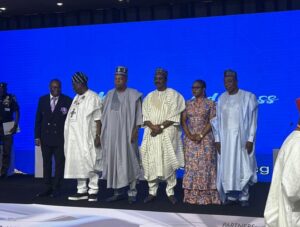By: Goodluck E. Adubazi, Abuja.
President Bola Ahmed Tinubu has described rail transportation as a crucial engine for Nigeria’s national development. The President made this known through Vice President Senator Kashim Shettima, while declaring open the 2nd International Railway Conference and Expo 2025 on Monday, September 15, in Abuja.
Speaking on behalf of President Tinubu, Vice President Shettima emphasized that railways are not just a means of transport, but a strategic tool for economic growth, industrialization, and social cohesion. He highlighted that nations that have successfully transformed their economies—such as China, Russia, and the United States—have heavily invested in railway infrastructure.

“Development without connectivity is an illusion,” Shettima declared. “We must learn from history and accelerate our efforts to position Nigeria as the logistics hub of Africa through modern, integrated railway infrastructure.”
Shettima noted Nigeria’s large and growing population—currently at 230 million and projected to reach 440 million by 2050—as a compelling reason to invest in reliable mass transportation. He called for stronger collaboration between government and private stakeholders to ensure timely and sustainable completion of railway projects.
The Vice President revealed progress made under the current administration, including moving the Kano–Maradi rail project from 5% to nearly 60% completion. He praised President Tinubu’s commitment to infrastructure as a means of fostering economic integration and reducing pressure on road transport.
Transport Minister: Railway is Gateway to Nigeria’s Economic Growth
In a related development, the Honourable Minister of Transportation, Senator Said Ahmed Alkali, has stated that transportation—particularly the railway sector—is the gateway to Nigeria’s economic development.
Delivering his welcome address at the 2nd International Railway Conference, Alkali lauded President Tinubu for creating an enabling environment for the transport sector to thrive. He noted that the Ministry of Transportation has prioritized railway modernization in line with the “Renewed Hope Agenda” of the current administration.
“Railways have always been more than just a means of transport. They are enablers of commerce, connectors of communities, and engines of industrial growth,” Alkali said.
The Minister outlined several achievements since the inception of the administration, including:
Increasing completion of the 203 km Kano–Kaduna rail line from 15% to 55%.
Advancing the Kano–Maradi line from 5% to 60%, with expected commissioning in March 2027.
Completion of the Lagos–Kano narrow gauge rehabilitation for freight transport.
Approval of six new modern rail terminals across Nigeria’s geopolitical zones.
He also revealed progress on the high-speed rail corridor connecting Abuja to Lagos, Kano, and Port Harcourt, with funding support from the China Development Bank and private investors.
Alkali emphasized that railways must become economic tools, not just physical assets. He highlighted the role of public-private partnerships, skilled workforce development, and sustainable financing as pillars of the Ministry’s long-term strategy.
Nigeria Doesn’t Need Foreign Loans for Railway Projects – De-Sadel CEO
In a bold statement during the ongoing 2nd International Railway Conference, Dr. Samuel Uko, CEO of De-Sadel Consortium, asserted that Nigeria can fund its railway infrastructure without relying on international loans.
According to Uko, Nigeria holds an estimated 210 trillion cubic feet (TCF) of proven gas reserves—the largest in Africa and the 8th largest globally. He proposed leveraging the country’s abundant natural gas resources to finance railway projects internally.
“With the right strategy, Nigeria’s railway sector can become self-sustaining within the next 10 years,” Uko stated. “We do not need to depend on foreign debt.”
He added that the proposed high-speed rail project would drastically reduce travel time across major cities:
Abuja to Lagos: Under 3 hours
Abuja to Lafia/Benue: Less than 30 minutes
Abuja to Port Harcourt: Within 1 hour
Uko’s comments sparked interest among local and international participants, highlighting alternative funding models and Nigeria’s vast untapped potential.
The first day of the 2nd International Railway Conference and Expo 2025 witnessed robust participation from across the globe. Delegates from Saudi Arabia, Morocco, and other African nations joined Nigerian officials, private investors, and industry experts to discuss opportunities and challenges in railway development across the continent.
With the theme “Opportunities and Challenges in Railway Development in Africa: A Call for Investment”, the event featured:
Panel discussions
Technological exhibitions
Cultural displays
Networking sessions
Organized by the Federal Ministry of Transportation in collaboration with Asaad Nigerian Media and the Abuja Chamber of Commerce and Industry, the conference aims to foster partnerships and attract investments to drive railway transformation in Africa.